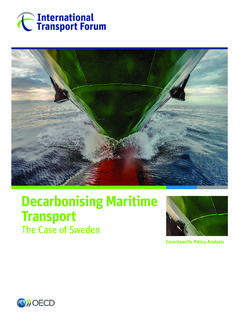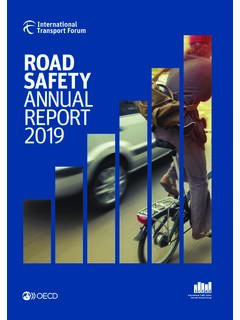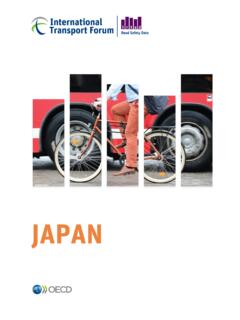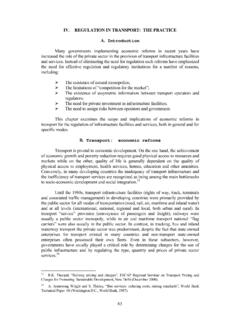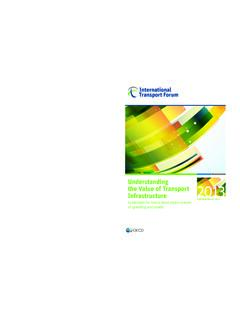Transcription of Gender and Transport - International Transport Forum
1 Gender and Transport 11. Discussion Paper 2011 11. Chantal DUCH NE. ChD Mobilit Transport , France This document was produced as background for the 2011 International Transport Forum , on 25-27 May in Leipzig, Germany, on Transport for Society. The views expressed in this document do not necessarily reflect those of the member countries of the International Transport Forum . Further information about the International Transport Forum is available at Gender and Transport Discussion Paper No. 2011-11. Chantal Duch ne Director ChD Mobilit Transport , France April 2011. Gender and Transport International Transport Forum . The International Transport Forum at the OECD is an intergovernmental organisation with 52 member countries. It acts as a strategic think tank with the objective of helping shape the Transport policy agenda on a global level and ensuring that it contributes to economic growth, environmental protection, social inclusion and the preservation of human life and well-being.
2 The International Transport Forum organizes an annual summit of Ministers along with leading representatives from industry, civil society and academia. The International Transport Forum was created under a Declaration issued by the Council of Ministers of the ECMT (European Conference of Ministers of Transport ) at its Ministerial Session in May 2006 under the legal authority of the Protocol of the ECMT, signed in Brussels on 17 October 1953, and legal instruments of the OECD. The Members of the Forum are: Albania, Armenia, Australia, Austria, Azerbaijan, Belarus, Belgium, Bosnia-Herzegovina, Bulgaria, Canada, Croatia, the Czech Republic, Denmark, Estonia, Finland, France, FYROM, Georgia, Germany, Greece, Hungary, Iceland, India, Ireland, Italy, Japan, Korea, Latvia, Liechtenstein, Lithuania, Luxembourg, Malta, Mexico, Moldova, Montenegro, Netherlands, New Zealand, Norway, Poland, Portugal, Romania, Russia, Serbia, Slovakia, Slovenia, Spain, Sweden, Switzerland, turkey , Ukraine, the United Kingdom and the United States.
3 The International Transport Forum 's Research Centre gathers statistics and conducts co- operative research programmes addressing all modes of Transport . Its findings are widely disseminated and support policymaking in Member countries as well as contributing to the annual summit. DISCUSSION PAPERS. The International Transport Forum 's Discussion Paper Series makes economic research, commissioned or carried out at its Research Centre, available to researchers and practitioners. The aim is to contribute to the understanding of the Transport sector and to provide inputs to Transport policy design. The Discussion Papers are not edited by the International Transport Forum and they reflect the author's opinions alone. The Discussion Papers can be downloaded from: The International Transport Forum 's website is at: or further information on the Discussion Papers and other JTRC activities, please email: 2 Discussion Paper 2011-11: Chantal Duch ne OECD/ITF 2011. Gender and Transport TABLE OF CONTENTS.
4 EXECUTIVE 4. Gender ON THE AGENDA .. 5. 1. Introduction .. 5. OVERVIEW OF THE SITUATION .. 7. 2. Characteristics of women's travel practices .. 7. 3. Influence of travel issues on the life of women ..11. 4. Failure to take account of women in decision-making processes ..12. 5. Women in Transport -related occupations ..12. EXAMPLES OF GOOD PRACTICES ..13. 6. Taking account of women's needs in the design of infrastructure, vehicles and services ..13. 7. Women's participation in the decision-making process ..13. 8. Employment of women ..14. RECOMMENDATIONS ..15. 9. Statistics ..15. 10. Women's participation in planning and decision-making processes ..15. 11. Taking account of the distinctive characteristics of women's mobility ..15. 12. Employment of women in the Transport Discussion Paper 2011-11: Chantal Duch ne OECD/ITF 2011 3. Gender and Transport EXECUTIVE SUMMARY. While greater account is increasingly being taken of Gender in a variety of areas, little progress has been made in this respect in the Transport sector.
5 In both developed and developing countries, our societies are gendered in that women and men play different roles, notably because household chores and children are mainly the preserve of women, which reduces the time they have available for activities for which they are responsible and for the trips they need to make in order to perform these activities. Development, employment and even health policies must take account of the issue of travel. And to do this successfully, it is essential to seek ways in which to incorporate the issue of Gender into policies relating to mobility and Transport . At present, it is no longer women's non-governmental organisations that stress this point, but the community as a whole. It is for this reasons that this theme is now being examined in greater depth by the International Transport Forum which commissioned this report. The report begins with an overview of the situation, and then presents good practices and a set of recommendations.
6 It addresses both developed and developing countries, urban and rural areas, and infrastructure and services. 4 Discussion Paper 2011-11: Chantal Duch ne OECD/ITF 2011. Gender and Transport Gender ON THE AGENDA. 1. Introduction Gender refers to the social construct which determines the social relations between men and women. Integrating Gender consists in taking account of the determinants of masculinity and femininity, as well as Gender -related obligations and needs. The concept of Gender equality refers to the aim of reducing inequalities of access and opportunity between men and women. The Universal Declaration of the Rights of Man recognises the equality of men and women: Whereas the peoples of the United Nations have in the Charter reaffirmed their faith in fundamental human rights, in the dignity and worth of the human person and in the equal rights of men and women and have determined to promote social progress and better standards of life in larger freedom.
7 The United Nations is working to raise awareness of inequalities between men and women, to combat these inequalities, and for women's rights at the International level. The 1979 Convention on the Elimination of All Forms of Discrimination against Women (CEDAW) is the most comprehensive International agreement on the fundamental rights of women. The Convention states that States parties to take "all appropriate measures, including legislation, to ensure the full development and advancement of women, for the purpose of guaranteeing them the exercise and enjoyment of human rights and fundamental freedoms on a basis of equality with men.. Equality is achieved not only at the social level, but also from an economic standpoint: the UN and the United Nations Commission for Europe stress the fact that equality is an integral part of a modern strategy towards growth. At the 1992 world summit in Rio de Janeiro, women's NGOs presented the Women's Agenda 21 , the outcome of two years of intense work by an International collective.
8 A lucid portrayal of maldevelopment, this document analysed the interconnections and linkages that exist between inequalities of access to resources and wealth, the lack of a sense of responsibility towards future generations among the main decision-makers, the war economy, etc. It proposed a new model of society and laid particular emphasis on better integrating the distinctive characteristics of women into all UN programmes and strategies. The official Agenda 21 incorporated some of the recommendations made in this document and stated that women had to receive greater recognition and play a greater part in the design and implementation of environmental policy. At the major International conferences which followed, women's NGOs continued to demonstrate their commitment to fairer development that shows greater respect for future generations. They asserted their resolve to campaign on all fronts for equal rights to participate in decision-making processes and to ensure that account is taken of the specific experiences and interests of all those who find themselves in a situation of heavy dependence.
9 For these women's NGOs, the themes of parity and sustainability are inseparable. Discussion Paper 2011-11: Chantal Duch ne OECD/ITF 2011 5. Gender and Transport This is borne out by data from the Social Institutions and Gender Index (SIGI) published by the OECD Development Centre which shows that countries that strongly discriminate women usually have poorer results in the implementation of several Millennium Development Goals. The issue of taking account of Gender in Transport is a fairly recent one. Since the statistics do not differentiate between men and women, it is hard to understand the differences in reasons for making trips, trip frequency, distances travelled, mobility-related problems in gaining access to health services, employment, etc. In the United States, where the feminist movement was extremely strong in the 1970s and 1980s, the issue was mainly addressed in the research sector, particularly under the auspices of Dr. Sandra Rosenbloom who has published numerous papers on this topic since 1975.
10 Research has also been carried out in Canada (Quebec) in the 2000s. The Transport Research Board has organised several conferences on this topic, the latest being in October 2009. In Europe, this issue first emerged in the 1990s, notably in France (with the founding of the Femmes en mouvement, les transports au f minin association), and in Sweden and Scotland with the creation of several associations of elected and/or professional women working in the Transport sector. The European Commission helped these associations to federate into a body (the EQUIP network) with which it could deal directly. Unfortunately, the EQUIP network was unable to have a regular activity over time. The issue of women and Transport was also discussed at a colloquy entitled: The challenges facing European society with the approach of the year 2000: role and representation of women in urban and regional planning aiming at sustainable development , organised by the Council of Europe Ornskoldsvik (Sweden) in March 1994.
